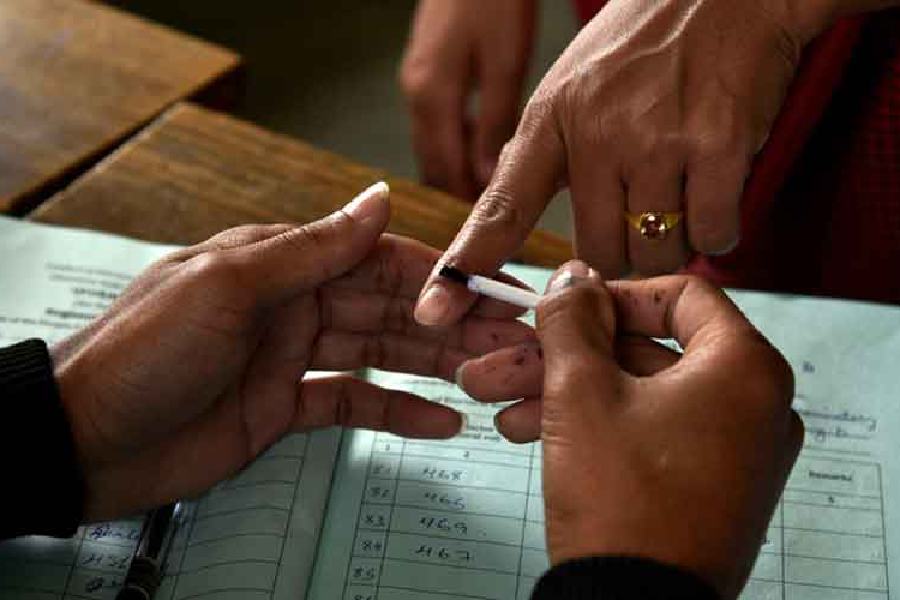Forty-two of the 102 Lok Sabha seats going to polls in the general election's first phase are constituencies that have three or more candidates facing criminal cases, according to a poll rights body.
The Association for Democratic Reforms (ADR) has analysed the self-sworn affidavits of 1,618 candidates out of the 1,625 contesting the elections in its first phase on April 19.
Out of the 1,618 candidates, 16 per cent or 252 candidates are named in criminal cases, with 10 per cent or 161 candidates facing serious criminal charges, according to the analysis of their affidavits by the organisation.
Seven candidates have murder cases lodged against them, while 19 are implicated in attempt to murder cases.
Eighteen candidates have declared in their affidavits cases related to crimes against women, and one of them, faces rape charge under section 376 of the Indian Penal Code (IPC), the ADR, which did the analysis along with National Election Watch, a coalition of civil society groups for domestic election monitoring, said. The organisation said that 35 candidates are linked to cases of hate speech.
The analysis showed that 42 or 41 per cent of the 102 seats scheduled to go to polls in the first of the seven-phase elections are "red alert" constituencies.
"Red alert" constituencies are those where three or more contesting candidates have declared criminal cases in their affidavits.
The analysis showed that among major parties, there are criminal cases against all four candidates of the Rashtriya Janata Dal (RJD), 13 (59 per cent) of 22 candidates of the Dravida Munnetra Kazhagam (DMK), three (43 per cent) of seven candidates of the Samajwadi Party (SP), two (40 per cent) of five candidates of the Trinamool Congress (TMC), 28 (36 per cent) of 77 candidates of the Bharatiya Janata Party (BJP) and 19 (34 per cent) of 56 candidates of the Congress.
The number stood at 13 (36 per cent) out of 36 candidates of the All India Anna Dravida Munnetra Kazhagam (AIADMK) and 11 (13 per cent) out of 86 candidates of the Bahujan Samaj Party (BSP).
In tandem with the revelations on criminal backgrounds, the ADR said the analysis also highlights wealth disparities among candidates.
It said, according to affidavits, around 28 per cent of candidates in the polls' first phase are "crorepatis" with assets exceeding Rs 1 crore. The average assets per candidate stands at Rs 4.51 crores, with notable discrepancies observed across party lines, the ADR found.
The analysis showed that among the major parties, more than Rs 1 crore assets have been declared by all four candidates of the RJD, 35 (97 per cent) of 36 candidates of the AIADMK, 21 (96 per cent) of 22 candidates of the DMK, 69 (90 per cent) of 77 candidates of the BJP, 49 (88 per cent) of 56 candidates of the Congress, four (80 per cent) of five candidates of the TMC and 18 (21 per cent) of 86 candidates of the BSP. Congress candidate Nakul Nath contesting from Chhindwara in Madhya Pradesh has declared the highest Rs 716 crore worth of assets followed by AIADMK' Erode (Tamil Nadu) candidate Ashok Kumar with assets worth Rs 662 crore.
BJP candidate Dhevanathan Yadav T, contesting from Sivaganga in Tamil Nadu, has assets worth Rs 304 crore.
Lok Sabha polls will be held in seven phases beginning from April 19 and the counting of votes will take place on June 4 for the world's biggest election exercise in which Prime Minister Narendra Modi will bid for a third consecutive term.
The other phases will be held on April 26, May 7, May 13, May 20, May 25 and June 1.
Except for the headline, this story has not been edited by The Telegraph Online staff and has been published from a syndicated feed.










